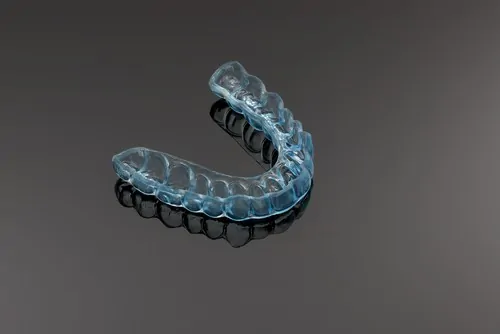Blog
Can a Dental Splint or Mouthguard Really Help with TMJ Pain?

Temporomandibular Joint Disorder (TMJ) is a condition that affects the jaw joint and the muscles surrounding it, leading to symptoms like pain, stiffness, headaches, and difficulty in jaw movement. Many individuals suffering from TMJ pain seek effective solutions to alleviate their discomfort, oftentimes without success. However, dental splints and mouthguards have gained popularity as potential treatments for TMJ pain and jaw discomfort, and may just be the right solution for you.
Understanding TMJ Pain
Before delving into the potential benefits of dental splints and mouthguards, it’s crucial to comprehend the nature of TMJ pain. The temporomandibular joint – or the TMJ – acts as a hinge connecting the jaw to the temporal bones of the skull. When this joint becomes misaligned or experiences excessive stress, it can result in TMJ pain. Common symptoms include jaw pain, difficulty chewing, clicking or popping sounds, and even headaches.
Are Dental Splints a Viable Solution for TMJ?
Dental splints for TMJ pain, also known as splint therapy or occlusal splints, are custom-made devices designed to fit over the teeth. They aim to stabilize the jaw joint and prevent excessive clenching or grinding, which are often associated with TMJ pain. These splints are typically worn during sleep, allowing the jaw muscles to relax and reducing strain on the temporomandibular joint.
In fact, research suggests that dental splints can be effective in managing TMJ pain by promoting proper jaw alignment and reducing the impact of habits like teeth grinding. However, the success of splint therapy varies among individuals, and it may not be a one-size-fits-all solution. It’s essential for individuals experiencing TMJ pain to consult with a dentist for a comprehensive assessment and personalized plan for TMJ treatment in Douglasville.
Mouthguards for TMJ Pain Relief
Mouthguards, commonly associated with athletes for protecting teeth during sports activities, can also play a role in managing TMJ pain. These devices are worn over the teeth to prevent grinding and clenching. By creating a barrier between the upper and lower teeth, mouthguards help reduce the strain on the jaw joint and alleviate TMJ-related symptoms such as jaw pain or headaches.
TMJ Treatment
While dental splints and mouthguards can offer relief for some individuals, it’s crucial to recognize that they are just one component of a comprehensive TMJ treatment plan. Seeking professional guidance from a dentist experienced in TMJ disorders is essential for accurate diagnosis and personalized care.
If you’re looking for jaw pain or headache treatment in Douglasville, you may just want to call your dentist, especially if nothing else has worked. Dental splints and mouthguards can be valuable tools in managing TMJ pain, but they are most effective when integrated into a comprehensive treatment plan. Always be open to talking with your dentist about any and all of your bodily symptoms, whether or not you think they’re related to dentistry. After all, they just may have the solution you’re looking for.
November Is TMJ Awareness Month

When we don’t feel well or are in pain, we turn to healthcare to find answers. However, sometimes symptoms don’t appear to have a direct cause, and occasionally the true problem is overshadowed by more widely recognized disorders. Temporomandibular Joint Disorder, or TMJ, is one such condition. This November, your dentist in Douglasville observes TMJ Awareness Month, a dedicated time to shed light on the challenges faced by millions of individuals battling this often misunderstood ailment.
What is TMJ?
TMJ (technically TMJ Disorder or TMD) is a complex condition that affects the temporomandibular joint, the hinge that connects the jaw to the skull. This joint plays a pivotal role in our daily lives and allows us to eat, speak, and express emotions through facial expressions. When it functions seamlessly, it goes unnoticed, but when TMJ problems arise, symptoms can be severely debilitating. Some symptoms of TMD include:
- Jaw pain
- Facial pain
- Headaches
- Difficulty chewing or speaking
- Clicking or popping sounds when opening and closing the mouth
- Jaw locking in place.
While an estimated 36 million Americans suffer from TMJ disorder and these symptoms, there is often a lack of awareness and understanding, both among the general public and within the medical community. In fact, those struggling with TMJ disorders can find themselves on a frustrating journey to find answers and get relief. The complexity of the condition, combined with the lack of awareness, often results in delayed diagnosis and inadequate treatment. Many individuals go undiagnosed or misdiagnosed for years, compounding their pain and suffering. That’s where TMJ Awareness Month comes into play.
About TMJ Awareness Month
TMJ Awareness Month aims to educate both patients and healthcare providers on the condition and help dismiss misconceptions. In fact, TMD is not just a jaw problem; it can have far-reaching effects on a person’s overall health and quality of life. According to the National Academy of Medicine report on TMJ, 30-plus health conditions can coexist with TMJ disorders such as:
- Back, neck, and joint pain
- Headaches
- Heart disease
- Hypertension
- Respiratory conditions
- Sleep disorders
- Depression, anxiety, and post-traumatic stress disorder
- Tinnitus
If you have symptoms of TMJ or other related health issues, talk to your dentist in Douglasville.
Healthcare professionals, including dentists and physicians, need to understand the importance of recognizing and addressing TMJ disorders so patients can get relief. The month of November is an opportunity for those individuals, as well as those affected by TMJ disorders, to share their stories and advocate for better research, treatment, and support. It’s time to rally for improved insurance coverage for TMJ treatments.
As we delve into TMJ Awareness Month, it’s essential to remember that awareness is just the beginning. The ultimate goal is to improve the lives of those grappling with TMJ disorders. By working together to promote awareness, advocate for better treatment, and advance research, we can make a significant difference in the lives of millions.
Stress & Oral Health

Even though the craziness of the holidays is behind us, it doesn’t necessarily mean our stress levels have decreased. Everyday life can certainly cause anxiety and contribute to more stress. As many people know, stress can impact our health and overall well-being, but did you know stress can also contribute to oral health problems? Today, the team at our Douglasville dental office will cover some ways your oral health may be affected by stress.
Increased Jaw Pain
When we’re overly stressed, our bodies respond in different ways. Sometimes we aren’t even aware of how our bodies are reacting. One common side effect of high stress that can go unnoticed is tooth clenching and grinding. When we continuously grind or clench, we place unnatural, increased force on our teeth and our jaw joints. Not only can this cause teeth to break or chip, but it can also increase jaw pain. If left untreated and clenching and grinding continues, you could develop TMD (also known as TMJ).
Gum Disease
Gum disease is often caused by poor dental hygiene, but there are other factors that can put you more at risk for developing it. Stress just so happens to be one of those things. Studies show a positive link between prolonged exposure to high levels of stress and a greater risk for gum disease. If not treated promptly by your dentist in Douglasville, gum disease can contribute to concerns throughout the body such as heart disease and tooth loss.
Canker Sores
These annoying and often painful sores can seem to pop up out of nowhere, and the truth is nobody truly knows what causes them. However, research has concluded that canker sores seem to have some sort of correlation with both certain foods and also high stress. Unlike cold sores, canker sores aren’t contagious, just annoying, and should go away on their own.
Relax & Protect
The best way to protect your oral health against the damaging effects of stress is to find ways to relax and lower stress levels. Some healthy relaxation methods include:
- Eating. Giving your body the nutrients it needs to function properly can help fight off stress. Balance your diet with fruits, vegetables, and whole grains.
- Sleeping. Many Americans don’t get enough sleep regularly, and when we’re tired our bodies aren’t able to adapt and overcome stressful situations as easily. Try to get the recommended 7-9 hours of shut-eye every night.
- Moving. Exercising helps our bodies release more endorphins, serotonin, dopamine, and testosterone, all of which help make us feel happy and good and lower stress. Go for a walk, hop on a treadmill, or take a yoga class.
As you embark on a new year, make a commitment to yourself to keep stress low. Your body and your mouth will thank you.
Migraine Awareness Month

June is recognized as National Migraine and Headache Awareness Month and serves to not only educate the population on this debilitating illness, but also to increase funding to advance migraine research and treatment options. While numerous causes can be to blame, our dental office in Douglasville wants to take a closer look at how migraines may be related to dentistry.
Migraine Facts
Over 39 million Americans are affected by migraines, including 18% of U.S. women, 6% of men, and 10% of children. Migraines are also rarely cured, but rather treated and managed through changes in lifestyle or medications. These treatment methods help help lessen the effects of the common migraine symptoms including, but not limited to:
- Throbbing or aching pain in the head
- Sensitivity to light and noise
- Blurred vision
- Neck pain
- Vomiting
- Nausea
These symptoms are often so severe that many sufferers can’t go to work or complete everyday responsibilities when experiencing a migraine.
How Migraines May Be Related to Dentistry
Many migraines can be triggered by an excess surge in serotonin release caused by stress, certain foods, or bright lights or loud noises. However, more research has been showing a positive correlation between migraines and a poor bite or habitual bruxism (tooth grinding or clenching).
Poor Bite & Migraines
A poor bite is diagnosed when the top and bottom jaws don’t align properly. When this happens, the jaw muscles, neck muscles, and even the muscles in the base of the head experience unnecessary pressure every single time the jaws come together. Since that action is done repeatedly every day, those muscles get tired easily and inhibit the normal blood flow. The result could very well be a migraine.
Bruxism & Migraines
Bruxism is a condition that causes people to constantly clench their teeth or grind them repeatedly, sometimes while they’re asleep and don’t even realize it’s happening. This repetitive stress on the jaw muscles can lead to headaches or migraines.
If you suffer from migraines or unexplainable headaches in the morning, you may have a poor bite or clench your teeth at night. But you don’t need to continue to live in pain or without answers. Start your search towards relief by calling our Douglasville dental office today. We can check for signs of bruxism and TMJ and recommend the best treatment options for you.
Can All This Holiday Stress Affect Your Oral Health?

Every year around this time, we begin the hustle and bustle of the holidays. Coordinating schedules, braving the crowds at the grocery store and in the mall, cooking meals, and all the craziness that comes along with preparing for the holidays is bound to increase stress levels. But during a time when we’re supposed to be enjoying friends and family, stress is that last thing we want to get in the way. After all, as everyone at our dental office in Douglasville knows, stress can wreak havoc on not only our overall health, but oral health as well.
A Little Clench & Grind
During times of increased stress, we tend to subconsciously clench our teeth tightly together or grind them against each other. While this may seem like no big deal, if done repeatedly over a long period of time, grinding and clenching can cause damage to both the teeth as well as the jaw joint. Putting constant force on the teeth can lead to chipped, cracked, or fractured teeth, while habitually engaging jaw muscles may cause TMJ disorder. TMJ disorder can be painful and may lead to long term problems. So if you’re experiencing any popping, clicking, or locking in the jaw joint, we recommend contacting your Douglasville dentist.
Gum Disease
Usually we talk about gum disease being caused by an improper hygiene routine or missing regular visits with your dentist. However, recent research has also shown a positive link between stress and the development of gum disease. Gum disease is a serious condition that not only affects your mouth, but your whole body as well. If left untreated, gum disease can cause tooth loss, heart disease, and pregnancy complications, along with a host of other health problems.
Take It Easy for Health’s Sake
To help protect your body and oral health during the stressful holiday season, we encourage you find ways to help yourself relax. Check out the following tips for a few things to try.
- Breath it Out. Something as simple as setting aside a few moments to take a few deep breaths can really help lower stress. Practicing deep breathing exercises has been proven to lower blood pressure and reduce overall anxiety levels.
- Work it Out. Hit the gym, go for a walk, do some yoga. Whatever you choose to do, just get your heart pumping and sweat it out. Physical exercise can do wonders to decrease stress, and all the other health benefits don’t hurt either.
- Sleep it Off. It can be difficult to get enough sleep during non-crazy times of the year. And during the holidays it can be even harder. Remember to schedule in time to make sure you’re catching enough zzz’s. Giving your body a chance to relax can keep you healthy so you can actually enjoy everything the holidays have to offer.
From all of us at our Douglasville dental office, we hope you have a great holiday season with limited stress and anxiety and packed full of friends, family, laughs, and great memories.
What’s a Dental Night Guard?

So you’ve just had your six month dental checkup and you were told you need to consider getting a dental night guard. What exactly is a dental night guard and what is it for? The team at our dental office in Douglasville is here to explain.
What’s a Dental Night Guard For?
Dental night guards are often the treatment of choice for patients who have a history of grinding their teeth while they sleep. Also known as bruxism, tooth grinding typically occurs at night when patients have no way of knowing they even do it. Chronic bruxism can lead to several problems with teeth and even the jaw. If left untreated, bruxism can cause broken, chipped, or cracked teeth, headaches, and TMJ/TMD. Bruxism can be treated and should be done so early to avoid future problems.
What Types of Night Guards Are Available?
There are two types of night guards: professional, custom-made and over-the-counter, boil and bite. While the night guards found at drugstores can work to reduce tooth grinding, there are several benefits to choosing a custom night guard made by a dentist. To begin, custom-made night guards use detailed molds of your teeth, making them a more comfortable choice. Your dentist will also consider the alignment of your jaw during the fitting process to ensure your night guard won’t place unnecessary stress on the joint which could lead to other problems. Lastly, while a store-bought night guard may seem attractive at first due to the lower cost, custom-made night guards usually last up to 10 years, making them a more cost-efficient option in the long run.
Are There Other Treatment Options?
Night guards may be the most common treatment method to stop tooth grinding, but it certainly isn’t the only option. Other recommended treatments may include methods of stress reduction, limiting the intake of caffeine or medication with stimulants, or perhaps orthodontics to straighten teeth and realign the jaw.
Signs of Bruxism
While your dentist in Douglasville is the best person to diagnose bruxism, there are several signs you should keep a lookout for in between visits including:
- Flat or chipped teeth
- Tooth sensitivity
- Waking up with sore jaw muscles
- Neck or facial pain
If you happen to notice any of these signs and suspect you may be grinding your teeth, we welcome you to give our Douglasville dental office a call to schedule an appointment. We’ll perform a thorough evaluation in our relaxing office to determine if bruxism is the root of what you’re experiencing. If it is we’ll talk with you about your treatment options and work together to decide which one may be best for you.



